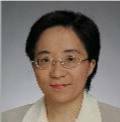Awardee Interviews | Biography: Jane P. Chang
Jane P. Chang

Jane P. Chang received her B.S. degree in Chemical Engineering from the National Taiwan University in 1993, her M.S. degree in Chemical Engineering Practice from Massachusetts Institute of Technology in 1995, and her Ph.D. degree in Chemical Engineering from Massachusetts Institute of Technology in 1998, under the direction of Herbert H. Sawin. Her Ph.D. research delineated the plasma surface interactions through reactive beam scattering experiments and simulated feature profile evolution in chlorine etching of patterned polysilicon by the Monte Carlo method. She was a post-doctoral member of technical staff with Robert L. Opila at Bell Labs, Lucent Technologies, from 1998 to 1999, where she expanded her research from plasma processing to electronic materials synthesis and processing, and demonstrated effective gas-phase chemical cleaning and passivation of silicon surfaces. In collaboration with Vincent M. Donnelly and M.L. Steigerwald, she applied angle-resolved x-ray photoelectron spectroscopy to nondestructively determine the compositional profiles of ultrathin silicon oxynitride and investigated the use of tantalum pentoxide as a high dielectric constant material for its applicability in embedded dynamic random access memory devices. She joined the Department of Chemical and Bio-molecular Engineering at University of California, Los Angeles, as an Assistant Professor in 1999, was appointed the William F. Seyer Chair in 2000, and is currently an Associate Professor.
At UCLA, Chang's research interests are on the synthesis and chemical processing of novel electronic materials, an atomistic understanding of solid state interfaces, and their applications in microelectronics, optoelectronics, and micro-sensors. Specifically, her research group studies the synthesis of inorganic thin films with tailored electronic, chemical, and thermal properties by novel atomic layer controlled thermal, radical, and plasma enhanced deposition techniques, develops highly selective plasma etching processes for patterning nano-metered thin films, and designs and develops micro chemical sensors, some of which combine the synthesized multifunctional dielectric materials with electronic devices to detect chemical warfare agents. In addition, her research group integrates the experimental and first-principle theoretical approaches to elucidate the fundamental physical and chemical origins of superior material and electronic properties.
Chang is the author of more than 50 journal publications, including a book and a book chapter, holds 3 U.S. patents, and has given more than 80 invited presentations at many international conferences, academic institutions, and industry throughout the world.
Chang received the Coburn and Winters Award from the Plasma Science and Technology Division of AVS in 1997, an NSF Career Award in 2000, a Chancellor's Career Development Award from UCLA in 2000, a Young Investigator Award from the Office of Naval Research in 2003, and the O. Hugo Schuck Best (Application) Paper Award from the American Automatic Control Council in 2004. For her undergraduate teaching, Chang received the TRW Excellence in Teaching Award in 2002 and the Professor of the Year Award from the Chemical Engineering Department at UCLA in 2003 and 2004.
Chang is an active member of AVS, AIChE, MRS, and ECS, as symposium or session chairs. She served as a member of the Executive Committee and Treasurer of the AVS Plasma Science and Technology Division in 2002-2004, and served on the program committees of the AVS Plasma Manufacturing Science and Technology Division and the International Conference on Microelectronics Interfaces.